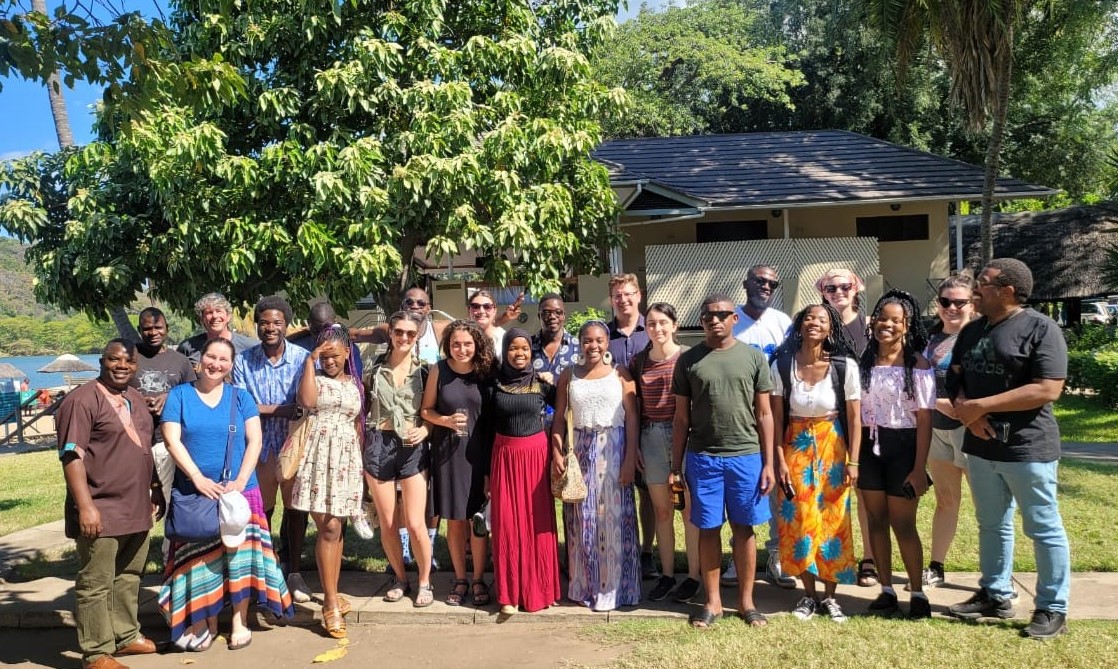In February, Tropical Cyclone Freddy devastated Malawi, with hundreds of people reported dead and thousands displaced. The area near Lake Chilwa, Malawi’s second largest lake, flooded. Fishing communities lost their livelihoods. Standing water from the cyclone extended the malaria season. The intensity and longevity of the storm were viewed by many as indicative of climate change.
In May, a group of students and faculty from the University of Maryland Francis King Carey School of Law and the Chancellor College of Law at the University of Malawi visited the region. The group was part of the Environmental Justice, Human Rights, and Public Health course, a collaboration between the two schools, enabling the partners to address and examine the intersection of environmental justice, human rights and public health from international and comparative legal perspectives. For the first time since the pandemic, Maryland Carey Law students and faculty traveled to Malawi for a 10-day trip to meet their counterparts in Malawi and see firsthand many of the issues they’d discussed during the class.
“It was heartbreaking, but so valuable to visit the villages and the sites that were devastated by the cyclone,” said Margaret Bushko ’23.
During the classroom portion of the course, students from both universities met weekly over Zoom. On the U.S. side, the course is co-taught by the managing director of the Environmental Law Program, Bill Piermattei ‘99; Professor Peter Danchin, associate dean for research and faculty development and co-director of the International and Comparative Law Program; Professor Robert Percival, director of the Environmental Law Program; and Diane Hoffmann, director of the Law and Health Care Program. Chikosa Banda, dean of the University of Malawi law school, co-designed the course and frequently lectures as well.
In addition to the classroom portion, groups of four or five students from both universities research specific issues and propose potential solutions. Their work product includes research papers, draft complaints, and more. For example, Rosemary Ardman ’24’s team drafted a complaint challenging the failure of the government in Zomba, the Malawian city where the university is, to maintain its sewer system.
During the trip to Malawi, the group went on site visits to areas like Lake Chilwa impacted by climate change, met with environmental justice nonprofits, and discussed the research they’d done during the course. In addition, Danchin presented the Matembo Nzunda public lecture, titled “New Directions in Environmental Justice in International Human Rights Law,” at the invitation of the University of Malawi.
“You don't gain an appreciation of the context until you actually show up and start traveling around and talking to people and talking to environmental nonprofits and seeing the kinds of constraints they have to work under,” said Piermattei. The conversations with Malawian nonprofits, he added, have helped to refine the types of advocacy work students can undertake to assist these groups.
Other meaningful conversations happened on the bus between destinations. Students and faculty from both countries got to know one another and carried on long discussions about culture and interests, in addition to debriefing on their site visits. Although the trip was at times emotionally taxing and highlighted daunting environmental justice issues, said Ardman, bonding with Maryland and Malawi students as the bus bumped along rough dirt roads in rural areas was “just so incredibly fun.”
In August, the University of Malawi contingent will visit Maryland Carey Law with tours of local attractions, nonprofits, and environmental sites in the works. Bushko graduated in the spring but still hopes to participate and help provide a meaningful experience for her new Malawi friends like she received in their country. “It was really such a valuable learning experience but then it was also filled with all this joy and bonding and a wonderful time with our colleagues,” she said.

